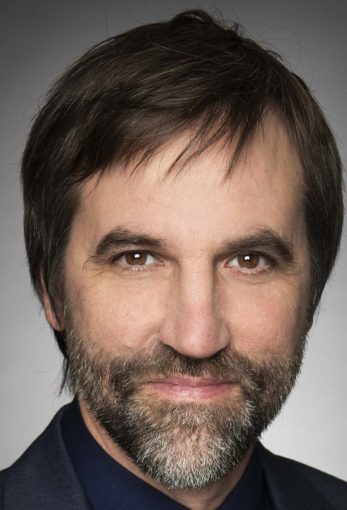
World says farewell to comedic great
Canada has long been known as a hot bed for comedic talent. This well-deserved reputation can be attributed in no small part to the pioneering efforts of the comedy team Wayne and Shuster. Johnny Wayne and Frank Shuster first teamed in high school and developed into one of Canada’s most influential comedy teams. They worked together for 56 years until Wayne’s death in 1990.

Tax incentive proposed for California
Vancouver: On Jan. 11, California’s Governor Gray Davis injected new life into the ongoing runaway production controversy by floating a proposal for a new labor-based tax incentive for lower-budget California productions. At the same time, the Film and Television Action Committee, which has lobbied against runaway productions, temporarily withdrew its petition filed late last year calling for countervailing duties on U.S. shows shot in Canada with Canadian tax credits.

Fate of DesRochers, To remains in question
Vancouver: Mystery continues to shroud the paid suspension of the B.C. Film Commission’s director and marketing manager while the government ministry investigating their ‘managerial procedures’ is weeks from clearing the air.

Cameron Thomson Entertainment emerges
Toronto-headquartered business development company Cameron Thomson Group has opened a production arm called Cameron Thomson Entertainment and inked a deal with Italy’s Scala Group to develop a half dozen art-based TV series.

Image Engine debuts CG actor
Vancouver F/X shop Image Engine Design has designed and animated a revolutionary 3D CG ‘actor’ for the season finale of MGM’s Stargate SG-1. The character, an alien named Thor with a rubbery epidermis and protruding cranium, had previously appeared on the series, having been shot as a puppet. The puppet had aged and Image Engine approached the producers of the locally shooting sci-fi series to digitally construct a new Thor that would allow the character a greater range of behavior.

People
* As part of Cinar Corp.’s restructuring program, the Montreal house has brought back Louis Fournier as head of distribution.

Ex-Cinar prez gathers no Moss
Choosing not to wait around for Cinar’s fate, Peter Moss has stepped down as the president of Cinar Entertainment, but will remain a consultant for the troubled Montreal-based animation production company.

Nelvana acquires Beyblade, Berenstein Bears
Toronto-based animation giant Nelvana has secured television distribution rights for the red-hot Japanese animated kids series Beyblade for North America, South America, Europe and Oceania (excluding Turkey, Italy, Greece and Arabic-speaking countries).
The deal gives Nelvana home video and broadcast distribution rights to all 51 Beyblade episodes (produced in Japan by Mitsubishi’s wholly owned subsidiary d-rights). The series will air in Canada on YTV as early as summer 2002.
The agreement also allows Nelvana to act as agent for the importation and distribution of all Beyblade metal and plastic spinning tops from toy licensees Hasbro and Takara.

Dead Zone comes alive in Vancouver
Vancouver: The USA Network has picked up a full season of 20 hour-long episodes of Lions Gate Television’s The Dead Zone. Vancouver’s Crescent Entertainment will oversee production.
The series, based on the Stephen King novel, will debut in June and will be distributed in North America by Lions Gate and internationally by Paramount.
Anthony Michael Hall, who starred in the two-hour pilot shot in Vancouver in 2001, will carry on with the series about a man who emerges from a long coma with psychic abilities. Nicole De Boer, Chris Bruno and John Adams costar in the series that promises a mix of action, romance, the paranormal and the quest for justice.

Parliament acts, or does it? The continuing saga of JumpTV
David Kent is a partner in the Toronto law firm of McMillan Binch and a member of its Litigation, Knowlaw and Competition Groups.

Where CFFF $ will go in 2002
Vancouver: The Canada Feature Film Fund will undergo an overhaul in its sophomore year now that Telefilm Canada has accepted a handful of recommendations from a 24-member advisory group. But the details will have to wait until the new guidelines are announced early this year.

CanLit a hot commodity in option market
CanLit is white hot. Unless you’ve been hiding in a cave in Tora Bora or cryogenically frozen for the last decade, that should come as no surprise.

The pressure, privilege of performance envelopes
Camelia Frieberg is the Genie Award-winning producer of The Five Senses, The Sweet Hereafter, Eclipse, Exotica and Masala.

Distribs ready to release Canuck flicks
As Canadian distribution companies prepare to release a slew of new films at your local multiplex, the challenge to raise Canadian films’ presence on our screens from its current paltry 2% to 3% ensues.

D-cinema yet to take over
A couple of years ago some industry pundits forecast digital cinema would by now have rolled over traditional 35mm film projection. However, worldwide, there are currently only 35 true D-cinema auditoriums – theatres that digitally project movies stored on a hard drive, offering image quality that meets audience expectation.




 The definitive CDN broadcast and production resource.
The definitive CDN broadcast and production resource.










